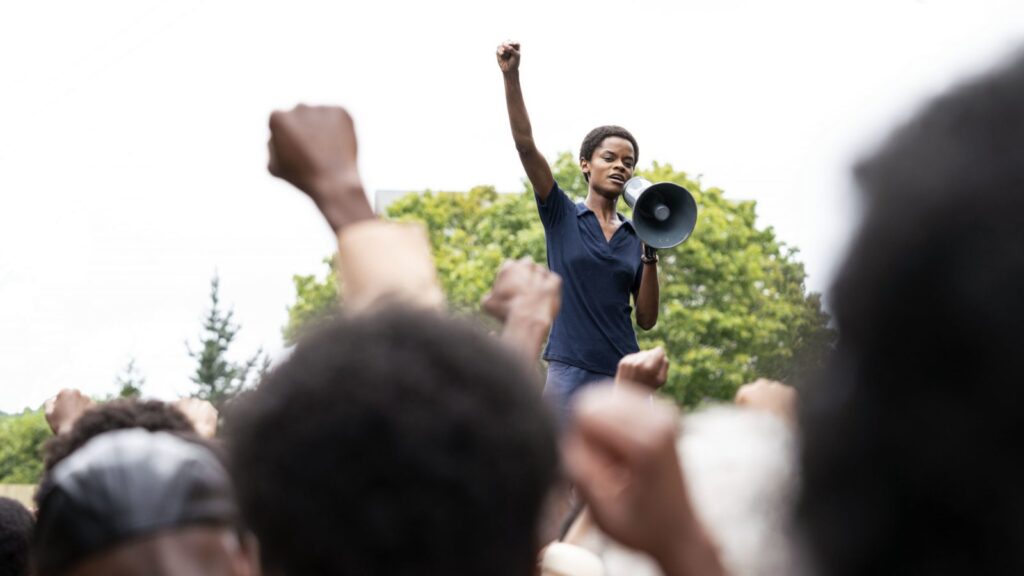Mangrove too often gets lost in its dusty courtroom formula, but it at least boasts a human center that contrasts with the film’s trial spectacle.
Steve McQueen has spent the last decade making films that are quite decidedly about America, creating a body of work in the process that carries significant cultural weight here (Oscars!) while very much representing the British filmmaker’s Euro perspective. This perspective often provides McQueen with a sort of remove to operate from, one that bears out his distinctive aesthetic nicely, but also one that has engendered criticism for being too distant to sensitively take on America’s insidious racist systems and the violence they conduct. And so, McQueen’s London-set, Small Axe “mini-series” is a welcome shift in focus to the director’s home city, as well as a vivid cinematic chronicle of a community that’s rarely been afforded one. This “mini-series” is essentially five feature-length films, each of which takes on a significant event in the history of London’s West Indian community (minus NYFF opening night entry, Lovers Rock– the series’ sole purely fictive narrative). It’s an impressive, maximalist approach on McQueen’s behalf, and one that we can’t completely assess until the final two films drop in November, but the series’ first entry, Mangrove, proves to be a sturdy statement of intent.
The film is basically split into two sections, the first depicting the opening and early days of Frank Crichlow’s (Shaun Parkes) restaurant, The Mangrove, which served as a social hub for London’s Notting Hill neighborhood; at that time, primarily home to a large population of Caribbean immigrants whom Crichlow proudly catered to. The Mangrove’s significance went beyond the food it served, as it also played host to community organizers and activists, and served as a space for parties and gatherings. All of this is rendered warmly and kinetically in the film’s early passages (not unlike the partying and revelry of the aforementioned Lovers Rock, actually), before souring quite dramatically as the film’s initial joys are crushed down by the arrival of the police and all the racism and violence that comes along with them.
Mangrove’s second section deals with the aftermath of the riots that came about at Crichlow’s restaurant after prolonged police harassment and instigation. This mostly translates into courtroom drama and the trial of “The Mangrove Nine,” which included Crichlow and eight other protestors who the police attempted to blame for the violence they themselves perpetrated. Mangrove doesn’t really manage to overcome the usual unfortunate cliches and formula of this genre, but as is often the case, the format is prime for big monologues and stirring performances and the film certainly serves those up. Letitia Wright and Malachi Kirby are given the most time to shine here as the two members of The Mangrove Nine who opt to represent themselves, thus giving them the power to cross-examine witnesses and address the jury, ultimately convincing them that the police’s crimes were racially motivated. These scenes feel cathartic and righteous, especially as they lead to the sort of legal victory that’s dispiritingly rare in real life, but they also only tell the story partially with the end title cards revealing the upsetting, long-term outcomes of this case.
One can understand McQueen’s inclination to steer this story away from miserablism by celebrating the remarkable triumphs that did occur, but the reality of the situation is much murkier and sadder than presented here. Yet the film does succeed when it orbits around Crichlow, who Parkes plays with remarkable vigor and intensity. McQueen writes him as a man swept up in history, a restaurateur accidentally transformed into the figurehead of a vital political movement. This may be a slight manipulation of the truth (Crichlow was a very politically engaged individual to say the least), but it ultimately works for McQueen’s dramaturgy, a reluctant human center in contrast with the spectacle of the trial. Sort of a recurring idea in a lot of NYFF’s lineup this year (Time, The Inheritance), Mangrove is most compelling when it’s reflecting on what it means to be an activist, and particularly, who gets to choose this work versus those whose entire lives must become acts of political activism. It’s unfortunate that McQueen gets lost in this dusty courtroom formula, but its archaic structures at least contrast the more immediate probing material in a way that mostly justifies its use.
You can currently stream Steve McQueen’s Mangrove on Amazon [denoted as Episode 1 of Small Axe].
Originally published as part of NYFF 2020 — Dispatch 3.


Comments are closed.